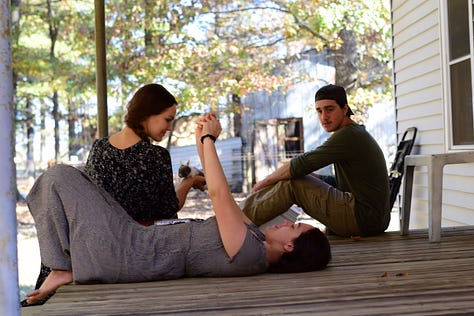Why I'm Not Actually Judging You
I will be linking to this article in all future posts about femininity and religion
Happy New Year’s!!
It’s my second winter as a married woman. Everything about life feels cozy and warm and scrumptious. I love our life together, and am excited about our goals, and about the inevitable surprises God has for us, too.
I hope, you all, too, are feeling hopeful about what’s ahead. I know it’s that time of the year where we want to make resolutions. We’re thinking of habits we want to discard, of virtuous attribute we want to cultivate, and of ambitions we’d like to achieve. Many of us are probably pondering our mistakes and regrets, and thinking that it’s time to clean the slate again. No more judgement. No more people-pleasing. No more negativity — maybe a little self-focus (I’m sure you all know how much I detest individualism!!).
I have plans for this Substack — mostly I have plans for books. I have shoe-horned myself into writing about femininity and religion. I’m not sorry about this, though. I love God, and I love my fellow women. I love learning from older women, and I love working with teenage girls. I have a lot to say about it all.
But it’s easy to be misunderstood when you write about these things online. It’s easy for people to dismiss what I have to say as “privileged” or “judgmental”. so my husband suggested I write an essay explaining why I write what I write for who it’s for, and to use this essay to link to what I’ll be releasing after this.
I hope you find value in this, and that we’re able to better understand one-another!
I recently met a younger woman who was my superior in nearly every regard.
We only had about fifteen minutes to walk beside one another before we had to part ways. Perhaps many wouldn't have talked at all in our given circumstances, but she was a true aristocrat — she engaged me in polite conversation that was neither boastful nor denigrating.
Everything about herself was immaculate.
I'm not sure that she dressed for the sake of modesty as she didn't seem to be religious. However those who are truly classy often portray similar results. It was clear that she knew what it meant to be a woman. Her dress was fairly long and fitted with elegance — neither baggy nor too tight. Her shoes were glossy without a scratch. Her socks were perfectly folded. Her hair was long and styled femininely. Her appearance was flawless, and so was her persona. She spoke deliberately and accurately, and we conversed on art, and literature. I felt I could just barely keep up, and I had a suspicion that she knew it and reigned herself in a little — maybe even simplified the conversation a little for my benefit. I gathered that she preferred to read the classics in their original language, that she was well-educated and well-traveled, and that she was a good mother and a faithful wife. I knew that if I were to visit her that her home would look a little like herself, and by herself I mean that there would be no signs of the idolized self, but that her home would be unobtrusively comfortable and orderly. I would find no bizarre decor or dirty diapers or unwashed dishes lying around, and I would be offered whatever it is she thought I might need in that moment.
I'm certain this woman has a lot of haters, although her demeanor was that of the well-loved woman. If I were insecure, I might hate her: I can never aspire to become completely like her, not in my lifetime, because she is the result of generational breeding. But I didn't feel that way. I was inspired — I was moved by her tact and elegance.
I knew that I could never be just like her, but I realized that with proper effort, my children might.



I write a lot about two of the most offensive hot-buttons: femininity and religion.
I am often blunt. I speak in absolute terms, and often portray truths framed as generalities. It is never my intention to offend, but I am aware that sometimes I am misunderstood anyways, and that I can cause people to feel judged or hated or unworthy.
What my readers should first know about my writing, is that I am writing for my past self. I am writing the things that I yearned to read as a young girl.
I was raised practicing certain beliefs, but did not understand them. I did not know why it was better to wear cotton than polyester, or why it mattered to dress in a beautiful way, or even how to cultivate femininity in a way that didn't feel oppressive. I didn't know that it was permissible to bake bread and be good at math simultaneously.
I desperately wavered between Virtue and Secularism as a girl, thinking I couldn't have some of both, believing that at some point I must spurn religion, tradition, and femininity for books, community, and excitement. The word submission rustled my feathers even though I was naturally demure. Likewise I was also disturbed by my liberal influences who told me I couldn't be free unless I wore make-up, cut my hair, and wore jeans1. I saw that my womanly skills were underrated, and I didn't understand that either.
I saw the inconsistencies in both the Christian and the Liberal worldviews. I felt my fealty fiercely pulled at by two falsities. I intuitively knew that while truth is absolute, the narrow straight path was actually somewhere between these two worlds.
I was not rebellious, but I did foster many doubts that angst couldn't relieve.
My experiments were fewer than other girls in my shoes, but only because I was wary as I opened myself up to any possibility. I observed all things but dabbled sparingly. I learned that a lot of people (religious and secular) simply didn't know anything, and that their lives were equally disastrous. There were a few who were beautiful, and I discovered that I wanted to be like them when I was older. I stayed with such women, and soaked up the experience of their example.
It was then that I began to discern right from wrong.
Discernment is the ability to judge well. When one discerns rightly, they act in accordance with what has been discerned. They transform — they transcend the fallen flesh that had possessed them.
This transformation is often mistaken as a condemnation of anyone else who hasn't or who won't better themselves. Society deludes its youth into thinking that there is nothing "better" or "worse", that one is "enough as you are", and that if one believes otherwise, one is "arrogant" or "judgmental".
I am not interested in analyzing anyone's life, nor in condemning them. I judge no man, but in humility, I have discerned — with the help of God — that some things are best while other things are base.
And so, I found myself looking to women who I aspired to be like, and spoke to girls that were reiterations of the self that I used to embody. My writing is merely the bridge between these versions of myself.
I understand nuance exists despite the nature of unchangeable, absolute truth. This is mysticism. However, there is a time to address nuance — we do this by how we live — and a time to deal in generalities — we do this in how we write and preach.
Our images and pictures can portray our nuanced beliefs. But our words should remain dogmatic, unyielding, and stern, even when we speak with charity. And we should always speak with charity, and never forget charity. However, charity is not spineless. It is blunt.
And so my writing is blunt. I wonder sometimes if my younger self would be offended at some of the things I write and will write? Perhaps. And yet, that is maturity — there are things that I now cherish that once I found intolerable, and I suspect that with humility, I will continue to find myself tested by ideas and believes and traditions that are at a first glance offensive. I can't give my readers humility, though, I can only assure you that what I write is not coming from a place of condemnation.
What I write is not even for all women — it is only for the girls and women who like me, are looking to discern right from wrong, and beauty from ugliness.
The Instagram Comparison Trap syndrome stems from the "Social Comparison Theory" developed by Leon Festinger in 1954. Briefly summarized, Festinger states that individuals will evaluate their own beliefs and behaviors by comparing themselves to those around them. If there is cognitive dissonance, an individual feels psychological discomfort and will try to rectify the difference in himself and his neighbors to reduce potential inconsistencies and restore natural order.
Where once comparing ourselves to those who are more mature and therefore "better" than ourselves might have been considered natural, or maybe even necessary for personal growth, it is no longer deemed healthy for the individual as it might lead to emotional entrapment and negatives feelings about the personal self.
Instead of being encouraged to grow and change, we are told to believe that we are enough as we are, and anything that tells us otherwise is a "trap" designed to make us feel worthless, jealous, and envious. Such feelings are "bad" feelings, according to the progressives world, and they should be avoided less they cause us to despair or to isolate ourselves from our community.
We aren't exhorted to assume personal responsibility for our feelings anymore.
It is someone else's fault for sharing "too perfect posts" to social media. Furthermore, if virtuous behavior is exemplified at all in real life, and if it causes us to feel ugly, that is labeled as "virtue signaling" even if the "perpetrator" is quietly minding their own business and not "preaching", nor have any intention to preach.
One who posts or dresses or does anything that is "counter-culture" has opened themselves up to the criticism and judgement of others (because the one who is counter-culture must be judging and therefore deserves judgement), or so it has come to be among in this era that is almost homogeneous if only everyone would be normal and stop judging.
Our society prefers the "messy hair, I don't care" trends to anything that might cause us to experience feelings of inferiority.
We want to wear the same clothes (preferably pajamas) to Wal-mart and to church. We don't want what's best for us, we want everything to be real (but only if that "real" means we're talking about our mental anxieties and bemoaning our incapacitates as women). We want to talk about our depression, our needs, and our base desires. Sacrifice is archaic and untenable. Beauty is meaningless and unimportant. Maybe it's even toxic, because it might make other women feel bad about themselves, and that's unhealthy.
And what is so bad about beauty? What if it's good to compare ourselves to one another, to be trapped by inspiration, to be provoked to bettering ourselves because of the example of others?
Quite a few portions of scripture deal with virtue, and how to best exemplify it through our actions and deeds instead of through preaching2. This does not mean that we don't preach, but that it is not the foundation of our faith. Our faith is proved through our beautiful works — or soured by ugly works. And yet modernity is offended most by Beauty because of how it might arouse feelings of inadequacy. Beauty is spurned because it makes us realize that we might actually be ugly.
It is beauty alone that can convict without words, and that can point and reshape culture and society into something naturally ordered.
And it is offensive that something — something that needs no words in any language — can be so powerful.
Comparison is good.
It is how we measure worth and merit, and like it or not, it is how we discern.
I am the result of generational breeding, too, though my case of it is not as extreme as someone born into nobility.
I suspect that my grandmothers and great-grandmothers are living proof of what can happen when you find yourself in a "comparison trap". They saw society degenerating, in their estimation, and they decided to do something about it.
My maternal grandparents sheltered their children from the horrors they saw around them. The results were not so pretty — for over-correction without looking to any sort of supreme authority for guidance on how to structure your "traditional" values can lead to another sort of horror. Their eight children were mostly traumatized. And yet, they had begun a new generation and instilled something into their blood that their grandchildren are able to benefit from, if so we choose.
It started a little further back for my paternal side, and because of that, whatever has been infused into my blood is more intuitive and less reactive now. My great-grandparents wanted something "better" for their children, too. And so they pioneered a new Christian schism. They would never know the fruit of their efforts — they would never live to see their grandchildren and great-grandchildren.
They an exceptional vision, but like my maternal grandparents they lacked a solid authority source. With eyes squinted, one might unfairly say that both sets of my grandparents failed. They were counter-culture, and their children were the experiment.
But I am the fruit of that experiment, and so are my cousins. We are not very disturbed nor distraught despite the anguishes of our aunts and uncles and parents, although we are very strange in this modern world. We were brought here through the suffering and travails of radical charismatics, and yet the waters have calmed greatly. What I have been gifted feels beautiful, and I know because of what my grandparents did for me, my own children's journey will be a little easier, if I can remember the ways of my fathers (quote Bible verse about this).
“Remember the days of old, Consider the years of many generations. Ask your father, and he will show you; Your elders, and they will tell you." ~ Deut 32:7
What my great-grandmothers and grandmothers have taught me is that generational breeding is only part of it. At any point YOUR gut can recognize beauty and yearn for it, and at any point you can yield to the path of righteousness. At any point you can turn your back on what you have known and begin anew.
It might be more difficult if you have no mentors or role models — neither did my grandmothers. It might be a trial to rewire your intuition to be feminine. It might be hard to purify your mouth, your mind, and your heart, or to start thinking and wearing beautiful attire. But it is not impossible, for we were each given the gift of discernment, and tradition encapsulates it so that it remains eternally accessible for each of us.
Progressivism has made it so it's safer to be sloppy than sorry.
And this is why people love nuance. They can say, "It's better for a woman to be a woman, and for a man to be a man." But then when confronted with "but what does that mean!" one can say, "Whatever you want it to!"
And so we have such silly sayings like, "Women can be feminine while also doing xyz." Sometimes these things are true. Often they stem from lazy, spineless propaganda.3
There is a texture to truth, but there are simple proverbs that are nonnegotiable.
Femininity is not wholly innate to a woman just because she has the correct chromosomes. Healthy femininity, like masculinity, is the result of cultivated instruction.
It is pointless and derisive to say, "Femininity matters," to clarify that "Actually a woman can be feminine while also being however she wants to be". That's simply not the case. It does not mean that the profane woman is too crass to be received into the Kingdom of Heaven, but she is surely not a Saint. There are basic principles that make a woman more or less feminine, and to ignore these things dishonest and cowardly.
I do not say these things to condemn, but to prevent an already flustered narrative from further infiltrating into the minds of young girls who just want to discern what it means to be feminine. There is a narrow, straight path, and yes, there is some variety on it. But it is a lie to think that femininity is also an all excepting tent with many shoes to fit anyone and everyone regardless of eligibility.
The same is true of religion.
I love religion, I love to write about religion. I will defend cults to my dying day, too, because I do not believe in condemning any expression of faith. That being said, I also believe there is an ultimate expression that is the most perfect, the most beautiful, and the best, and I will mince no words when comparing all faiths to that one. I am not at all nervous to compare any of these faiths to one another.
And yet, the conversation is convoluted because we have mixed our social spheres so that all the classes mingle in a way that is before this historically unprecedented.
Think of the aristocrats. Among themselves they were what they were both because of their blood and because of how well or poorly they adhered to their instruction. Those who had only one or the other would always stand out a little sorely when in a crowd of fellow well-bred, well-taught aristocrats.
Not dwell on the nature of their conversations, meant for their ears alone.
They would exhort each other, and compliment each other in a way that was meant only for one another. When they said, "A lady must --" or "A gentleman must --", they did not mean that every man or woman of every status or ethnicity must do as they spoke, but only those of their same class. And whoever wished to be of their class and stature must, do as they described. There were rules for decorum, and there was even variance for those who swerved a little off course. There was a certain allowance for those who might be a little more unorthodox. But in the great scheme of things, there was a certain way to be what was deemed best, and although they might speak politely about it, they were not wishy-washy. They were superior, they were high-born, and bred to remain so.
And yet, when one of these truly well-bred aristocrats would leave their circle, and interact with the outside world, they would have another set of rules. If they were truly proper, they would treat all men well, even the lowest of the low. And when they were among the lowest of the low, they knew that with humility they might learn a GREATER lesson, for was not that the only place that an aristocrat might learn the things that could not be learned in one's studies?
Yes, good manners were superior to poor habits, a dignified ensemble was more proper than rags, and the conduct of one's speech could make or break a man. It was best to be beyond reproach in speech, dress, temperament, and demeanor. It would be best if the peasants could become like them, for was it not best that all men have a savory, ordered character?
And yet, when one aristocrat was with one, or ever a few peasants, the one to learn the most would be the aristocrat. For being a better man, the aristocrat would understand how worthless his studies were without humility and kindness, and it was here among the poor that he might learn the most about God. It was here, where everything was dark and ugly and crass that a peasant might teach an aristocrat invaluable lessons. There was no condemnation from either. For in that situation, all their riches were as rags before God's eyes.
And some well-born men and women would choose to discard their fine garments to wear the rags so they might minister to the poor, for then it was remembered that the only robes worth waiting were waiting for all men alike in Paradise. And yet, they would never allow themselves to be uncouth, or unmannerly, or unsavory, and so even in rags, the aristocrat would stand out as a shining example of virtue and morality.



I recently met a woman who looked like an outdated Barbie that was left in the backyard too long to bake.
By any fair description, she was trashy, and probably dramatic. She was not someone who most decent people would want their daughters emulating. One might like her as a neighbor, but they'd never ask her to babysit their kids.
She was tall, thin, and wearing short, frayed denim shorts. Her skin was as orange as Trump's, and it was evenly wrinkled over her skimpily-clad body. She wasn't beautiful, but she was still "sexy". Every other word out of her mouth was profane and loud and vilely colored.
I was riding my bike past the bar, and didn't notice her until she shouted to me, "Hey, how do you ride your bicycle with a skirt?"
"I don't know," I answered. "I was raised this way, I guess."
"Wow," she slurred her words together. "I *** love that so much. I could *** never do that."
We talked a while, because she looked like she was feeling conversational. I don't remember what we discussed. I was just as fascinated by her as she was me, though. We were of extremely differently worlds, and yet, here we were together, comparing ourselves one to another, and not at all disturbed by our differences.
She admired me, and I respected her because she was one of the most authentic people I'd seen in a long while. Neither of us were bothered by the existence of the other. I was a prudish house-wife, and she was an old-fashioned bar hussy.
It came time to part ways, and she told me, "I admire you so *** much. Keep doing what you're doing. I just love that you wear a dress and don't wear shoes and bike and everything. You make me so happy."
We'd compared ourselves, yes. But there was no envy. We knew which paths we'd chosen, and we both knew that her path was not higher than mine, and yet, despite discerning right from wrong and choosing right, I was not a better person in God's eyes. We were both His daughters, both in need of His grace. Perhaps I was used to remind her of God's beauty. However, there was no judgement. We simply were who we were, partially the product of our upbringings, but also charitable and kind.
I raved about her for awhile to my husband after that. I was truly impressed by this uncouth woman who didn't feel insecure just because I was different from her.
I told my husband, "She is soooo authentic. What I can't stand is girls who dress like sluts but don't want to be called a slut. But that woman . . . she was so real. She dressed according to who she has decided to be,and she knows it, and she knows it's not good, and yet she's not putting the shame of her choices onto anyone else. She's perfectly content living with herself as she is."
I was inspired — not to be more like her per se — by her authenticity, and I felt compelled to be more authentic, too, and to discern whether my heart matched my skirt. For it is not enough to be beautiful outwardly if I have forgotten what it is to be humble.
I was also amazed by how that woman embraced her trashiness.
I do not mean to imply that she put no effort into her appearance. She was certainly trying to arouse male attention in everything she did from her miles of bared, tanned skin to short-shorts and mound hair-sprayed hair. Her make-up, too, was not lazy — it foretold her abilities and motives for the bedroom. She was not ashamed of the honesty that her appearance conveyed. She was not like other girls who get offended when they are told that they are trashy whores. She knew it and she flaunted it.
And yet she had the decency to see me exactly how I was and not hate me, but exhort me to keep on dressing and being just how I was. I did not condemn her — I rather liked her, if I am to be honest. But we both knew that she was not going to be my role-model.
To state this is to say that I have discerned that there is an objective difference between this woman and the woman whose portrait I painted at the beginning of this essay.
Many girls want to be treated like a lady while dressing like a slut, and they will get angry if anyone says anything to them about the inconsistency of their fashion and supposed motives. Such girls want to believe that they can be "feminine and trashy" or "classy and sexy" all at once.
We want to think that we can find a happy medium between the two women — that we can wear our booty shorts and have men opening doors for us without cat-calling our rear-ends. But such a thought — and manner of life — is inauthentic. If you are inauthentic, you will be offended by "comparison traps" because they will cause you to double-take. Your actions will have to be measured against your words, and if you're honest, you'll be forced to discern for yourself what is right and wrong. Or you'll skip the steps, and decide you're being unfairly judged and condemned for "being yourself". However, clothes are not "being yourself". They are and always have been statements about cultural values, and this will not change anytime soon.
We each must discern right from wrong for ourselves, and we do so by comparing ourselves to the examples we find in those we admire.
It is good to have your breath stolen away, and to feel “trapped” by conviction. It is good to search our hearts and to determine if we are as we ought to be. It is right to not blur the lines between good and evil.
It is not my job to condemn or judge an individual, however. It is my duty to do what’s ultimately best because it pleases God, and to be a humble example of beauty, virtue, and of Christ.
And yet, I do not write these things to condemn anyone.
I am not writing to change anyone. I am not writing for the woman who is already an aristocrat. I am not writing for the Barbie bar chic. Neither of those women would ever read what I write, anyway. I am not writing for the girls who dress trashy but want to be treated like women, either.
I write for the girls who are trying to be beautiful, and who are trying to figure out what that looks like in a tangible way. I am not being vague nor will I beat around the bush, for those girls deserve straightforward answers.
Thank you for reading.
My work remains free to the public so that those who might find encouragement from it can access it, and also because I’m unable to use Stripe without a social security number. However, if you’d like to support my writing, you can “buy me a coffee”. It’s much appreciated!
Earbuds, Blue Jeans and the Homogenized Woman
“What if you got stranded on an island and there weren’t any dresses, would you wear jeans?”
Deeds not words: Matthew 5:16, 1 Timothy 4:12, John 13:13-17, Philippians 3:17








Keturah, I love so much of what you write, but I’m very much struggling with the use of the words “slut,” “whore,” and “hussy” in this essay. I think these words are beneath the dignity of us all: they demean the women at whom they are directed and they speak ill of the people who use them. I was caught off-guard when I saw them used here.
I think you are absolutely right that we need to speak the truth clearly and without beating around the bush, but words like these are lacking in nuance and mercy. I cannot picture Our Lord encountering the Samaritan woman at the well and calling her a whore, or else referring to the woman caught in adultery as a slut, all the while telling the Pharisees that he who is without sin should cast the first stone. Indeed, St. Francis de Sales said that we ought to "cook the truth in charity until it tastes sweet." That does not mean that we weaken the truth, only that we make it palatable.
Like I said, I’m really struggling with this!
As a young woman who is doing her best to discern right from wrong, I greatly appreciate your bluntness. It challenges me to think deeply about these issues and encourages growth. :)
Thank you for sharing your writing, I always look forward to reading your words!